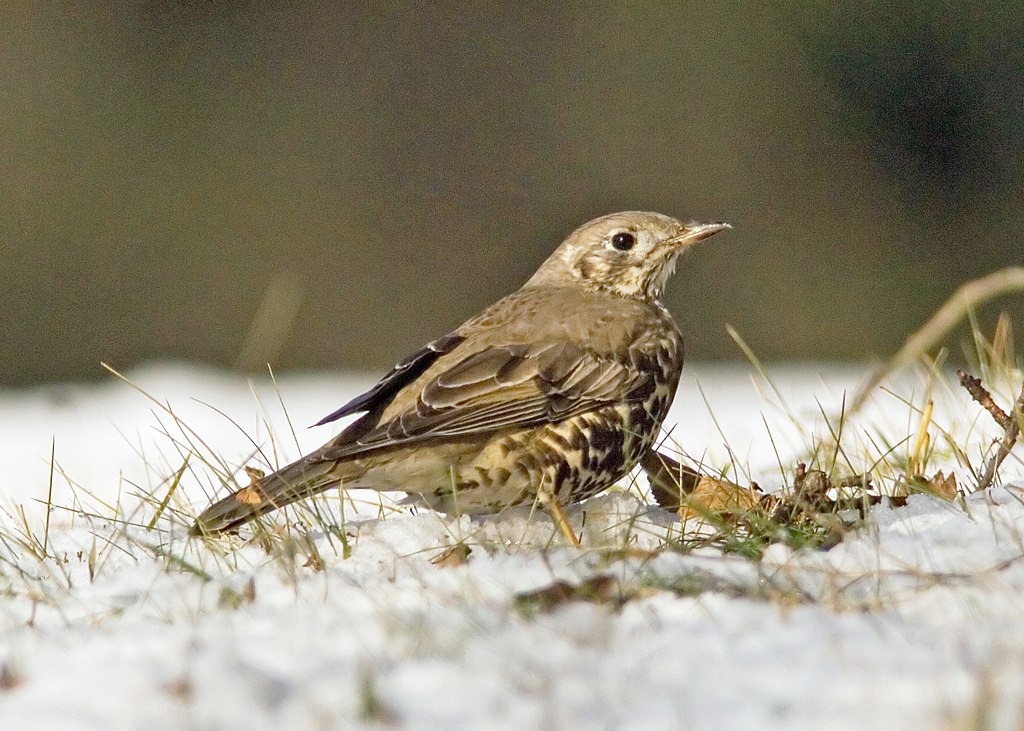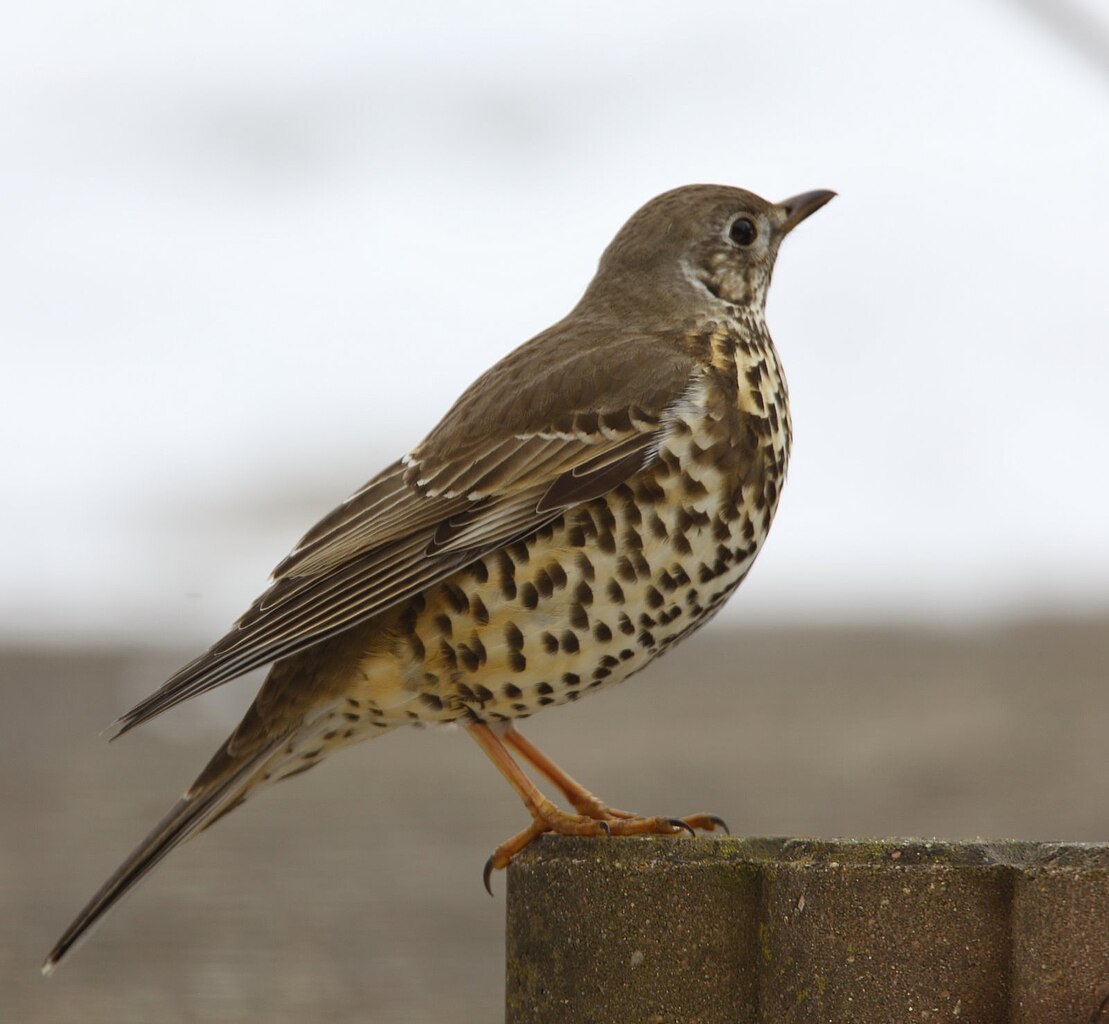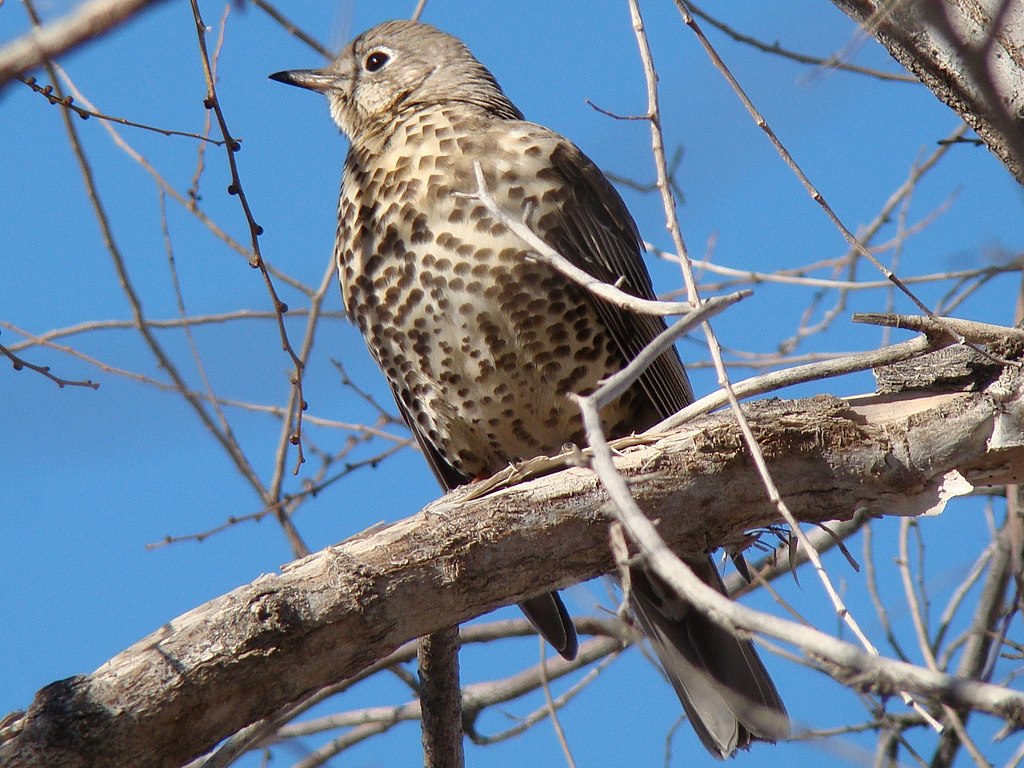
Mistle Thrush (Turdus viscivorous), England: photo by jo-h, 5 December 2010
I leant upon a coppice gate
.....When Frost was spectre-gray,
And Winter's dregs made desolate
.....The weakening eye of day
The tangled bine-stems scored the sky
.....Like strings of broken lyres,
And all mankind that haunted nigh
.....Had sought their household fires.
The land's sharp features seemed to be
.....The Century's corpse outleant,
His crypt the cloudy canopy,
.....The wind his death-lament.
The ancient pulse of germ and birth
.....Was shrunken hard and dry,
And every spirit upon earth
.....Seemed fervourless as I.
At once a voice arose among
.....The bleak twigs overhead
In a full-hearted evensong
.....Of joy illimited;
An aged thrush, frail, gaunt, and small,
.....In blast-beruffled plume,
Had chosen thus to fling his soul
.....Upon the growing gloom.
So little cause for carolings
.....Of such ecstatic sound
Was written on terrestrial things
.....Afar or nigh around,
That I could think there trembled through
.....His happy good-night air
Some blessed Hope, whereof he knew
.....And I was unaware.

Mistle Thrush (Turdus viscivorous), St. Johann, Styria, Austria: photo by Kurt Kulac, 24 January 2009


Mistle Thrush (Turdus viscivorus) in Baikonur-town, Kazakhstan: photo by Yuriy75, December 2009
Mistle Thrush (Turdus viscivorus viscivorus) singing near Germering in Bavaria: photo by N p Holmes, 28 February 2009

The male Mistle Thrush (Turdus viscivorus viscivorus) passed some earthworms to the female as a gesture of closeness. The female tasted one piece and thereafter the male fed the fledglings: photo by T. Voekler, 25 April 2008
On Hardy:
Ezra Pound (1938):
"No man can read Hardy's poems collected but that his own life, and forgotten moments of it, will come back to him, a flash here and an hour there. Have you a better test of true poetry?...
"There is a flood of life caught in this crystal."
Tom Raworth (2009):
"Always found interest in Hardy's poems myself."
Philip Larkin (1965, on Hardy's fiction):
"...'gaiety' -- by which I take [---] to mean buoyancy, relish, toughness, all things Hardy certainly possessed in good measure. But it surely cannot be denied that the dominant emotion in Hardy is sadness. Hardy was peculiarly well equipped to perceive the melancholy, the misfortunate, the frustrating, the failing elements of life. It could be said of him as of Little Father Time that he would like the flowers very much if he didn't keep thinking they would all be withered in a few days. Any approach to his work, as to any writer's work, must seek first of all to determine what element is peculiarly his, which imaginative note he strikes most plangently, and to deny that in this case it is the sometimes gentle, sometimes ironic, sometimes bitter but always passive apprehension of suffering is, I think, wrong-headed."
John Bayley (1978, contending with the view of poet-critics John Berryman and Donald Davie that The Darkling Thrush, is an ironic poem):
"....nothing in the poem is aware of the possibility of being organised for purposes of irony; its participants are preoccupied with their own affairs, the poet not least."
___
Some notes & remarks on poetry & life by TH:
"What made poetry 2000 years ago makes poetry now."
"The value of old age depends upon the person who reaches it."
___
W. H. Hudson: from Nature in Downland (1900), on the Mistle Thrush:
"Mid-winter is the season of the missel-thrush... when there is no gleam of light anywhere and no change in that darkness of immense ever-moving cloud above; and the south-west raves all day and all night, and day after day, then the storm-cock sings his loudest from a tree-top and has no rival. A glorious bird!... You must believe that this dark aspect of things delights him; that his pleasure in life, expressed with such sounds and in such circumstances, must greatly exceed in degree the contentment and bliss that is ours, even when we are most free from pain and care, and our whole beings most perfectly in tune with nature... The sound is beautiful in quality, but the singer has no art, and flings his notes out anyhow; the song is an outburst, a cry of happiness."



8 comments:
Circumstances were such that it is not only possible but likely that Hardy had read the Hudson passage I've cited, and that it added something to his angle of view here.
It's a historical poem, the old bird is up to his blast-beruffled plumage in the mouldering remains of a century.
All centuries, like Time itself, begin with ahistorical moments.
(But from there of course it's downhill all the way, and the rest is History... the orthopedics ward... the full-body cast & c.)
In its enshrouding itself from the get-go with historical poetic melancholy by means of the poetical-dictionary-izing adjective "darkling" Hardy's poem underwrites itself with familiar prior usage (King Lear, Milton, the Keats' Nightingale), and perhaps also recalls the "confused alarms of struggle and flight,/ Where ignorant armies clash by night," upon that most famous "darkling plain", the one upon which Matthew Arnold had prematurely left the same exhausted century gasping for breath at the end of Dover Beach.
None too soon had it finally ended by the time that absolutely disinterested thrush sang its cheerful evensong!
Tom,
That "aged thrush frail, gaunt, and small,/ In blast-beruffled plume" caught Yvor Winters' eye way back when -- you can almost see it, hear its singing here
full moon in eclipsed by earth's shadow before dawn this morning (viewed from RCA) also "spectre-gray" (thanks for keeping the coppice gate open). . . .
12.10
first grey light in sky above blackness
of ridge, moon in shadow below branches
in foreground, wave sounding in channel
seen from a ‘present moment,’
same ‘present moment’
as one is, “a state of mind”
which was, even there
silver of sunlight reflected in channel,
shadowed green slope of ridge across it
Hardy's poem and the photographs reminded me of How I Was Cured of Hunting"--a darkling glance at a guilt-ridden past.
Great thrush pictures. By coincidence, today my daughter inherited a set of Hardy's prose (well, there are seven books: Tess, The Mayor of Casterbridge, Far from The Madding Crowd, Jude, Return of the Native, The Trumpet Major, The Woodlanders - I'm guessing that's the lot). I'm quite looking forward to reading them myself.
Artur.
Steve,
Thanks for keeping the mind's eye open to the memory of RCA by starlight.
“a state of mind”
which was, even there
Vassilis,
That poem haunted the mind all through the livelong winter night & day.
Artur,
One could do worse than pass a long Norwegian winter beside the ingeniously-constructed stove, watching the hoar frost pixillate the windows and reading the grand novels of Hardy.
I'm enjoying this week of Hardy, Tom. Have you a favorite collection of his that you consider definitive? There is a naked space in my shelf's "H" that would delight in his presence.
By that comment, of course, I mean of his poetry.
Brad,
I have the great (and vast) MacMillan Collected Poems, which dates almost back to Stonehenge. I believe it was reprinted about ten years ago. But I'd wager you could find the earlier edition used, perhaps even in the turbid backwaters of [the] Amazon...
Post a Comment